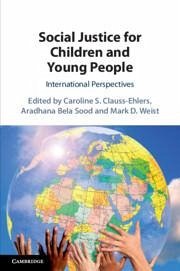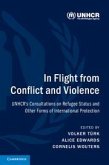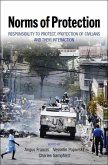Social Justice for Children and Young People
Herausgeber: Clauss-Ehlers, Caroline S; Weist, Mark D; Sood, Aradhana Bela
Social Justice for Children and Young People
Herausgeber: Clauss-Ehlers, Caroline S; Weist, Mark D; Sood, Aradhana Bela
- Broschiertes Buch
Andere Kunden interessierten sich auch für
![Human Rights and Law Human Rights and Law]() Ramesh Kumar TiwariHuman Rights and Law38,99 €
Ramesh Kumar TiwariHuman Rights and Law38,99 €![In Flight from Conflict and Violence In Flight from Conflict and Violence]() In Flight from Conflict and Violence40,99 €
In Flight from Conflict and Violence40,99 €![Anti-Impunity and the Human Rights Agenda Anti-Impunity and the Human Rights Agenda]() Anti-Impunity and the Human Rights Agenda51,99 €
Anti-Impunity and the Human Rights Agenda51,99 €![Human Trafficking Human Trafficking]() Human Trafficking35,99 €
Human Trafficking35,99 €![Norms of Protection Norms of Protection]() Norms of Protection43,99 €
Norms of Protection43,99 €![Bonfire of the Liberties Bonfire of the Liberties]() Keith EwingBonfire of the Liberties56,99 €
Keith EwingBonfire of the Liberties56,99 €![Religious Freedom Without the Rule of Law Religious Freedom Without the Rule of Law]() Andrea PinReligious Freedom Without the Rule of Law92,99 €
Andrea PinReligious Freedom Without the Rule of Law92,99 €-
-
-
Produktdetails
- Verlag: Cambridge University Press
- Seitenzahl: 517
- Erscheinungstermin: 30. Juni 2022
- Englisch
- Abmessung: 229mm x 152mm x 26mm
- Gewicht: 685g
- ISBN-13: 9781108447034
- ISBN-10: 1108447031
- Artikelnr.: 64225983
Hinweis: Dieser Artikel kann nur an eine deutsche Lieferadresse ausgeliefert werden.
- Herstellerkennzeichnung
- Libri GmbH
- Europaallee 1
- 36244 Bad Hersfeld
- gpsr@libri.de
Foreword; 1. An urgent call to understand the status of children and young
people within a social justice paradigm; 2. The language of social justice
for children and young people: Key terms and guiding principles; 3. Social
determinants of health: Children and consequences of socially unjust
policies; 4. Health and mental health disparities: Application of the
health capability paradigm for children and young people; 5. Children and
poverty: A global approach; 6. Educational access for women and girls as a
social justice issue: Ghana as a case study; 7. The youngest victims:
Children and young people affected by war; 8. Lesbian, gay, bisexual,
transgender, and queer youth and social justice; 9. Social justice for
child immigrants; 10. Social justice for children and young people with
disabilities; 11. Critical school mental health praxis (CRSMHP): A
framework for change; 12. Family-school partnerships within tiered systems
of support to increase access, improve equity, and promote positive
outcomes for all children and families; 13. Social justice and school
discipline: School-wide positive interventions and supports (SWPBIS); 14.
Understanding body respect as a social justice issue for young people; 15.
Australia; 16. The need for bridging the gap between academy and public
services in Brazil: Two case reports; 17. The education of migrant children
in China's cities; 18. Inequalities in healthcare for children and
adolescents in Colombia; 19. Learning for psychology via the Cuban program
of care for people affected by the Chernobyl accident: 1990-2011; 20.
Learning from the perspectives of at-risk resilient Ethiopian students: How
school-based resilience arises from connectedness, competence, &
contribution; 21. Social justice for children and young people: India
country qualitative case study; 22. Israel: Features of injustice in the
context of educational opportunities; 23. Social justice for children and
young people in Mexico; 24. Social justice for children and young people in
Norway; 25. Impact of decades of political violence on Palestinian children
in Gaza strip and west bank; 26. Social justice and children in Pakistan;
27. Social justice issues for children and young people in Peru and other
Latin American countries; 28. Social justice and adolescent health: A case
study of Rwanda; 29. Ending mental health stigma and discrimination: Young
people creating a fairer Scotland; 30. Violence exposure among children and
young people: Social justice for children and young people: International
perspectives: A South African case study; 31. Youth participatory action
research in urban public education: Minority youth addressing social
justice in the United States; 32. Conclusion: Being a change agent for
social justice for children and youth.
people within a social justice paradigm; 2. The language of social justice
for children and young people: Key terms and guiding principles; 3. Social
determinants of health: Children and consequences of socially unjust
policies; 4. Health and mental health disparities: Application of the
health capability paradigm for children and young people; 5. Children and
poverty: A global approach; 6. Educational access for women and girls as a
social justice issue: Ghana as a case study; 7. The youngest victims:
Children and young people affected by war; 8. Lesbian, gay, bisexual,
transgender, and queer youth and social justice; 9. Social justice for
child immigrants; 10. Social justice for children and young people with
disabilities; 11. Critical school mental health praxis (CRSMHP): A
framework for change; 12. Family-school partnerships within tiered systems
of support to increase access, improve equity, and promote positive
outcomes for all children and families; 13. Social justice and school
discipline: School-wide positive interventions and supports (SWPBIS); 14.
Understanding body respect as a social justice issue for young people; 15.
Australia; 16. The need for bridging the gap between academy and public
services in Brazil: Two case reports; 17. The education of migrant children
in China's cities; 18. Inequalities in healthcare for children and
adolescents in Colombia; 19. Learning for psychology via the Cuban program
of care for people affected by the Chernobyl accident: 1990-2011; 20.
Learning from the perspectives of at-risk resilient Ethiopian students: How
school-based resilience arises from connectedness, competence, &
contribution; 21. Social justice for children and young people: India
country qualitative case study; 22. Israel: Features of injustice in the
context of educational opportunities; 23. Social justice for children and
young people in Mexico; 24. Social justice for children and young people in
Norway; 25. Impact of decades of political violence on Palestinian children
in Gaza strip and west bank; 26. Social justice and children in Pakistan;
27. Social justice issues for children and young people in Peru and other
Latin American countries; 28. Social justice and adolescent health: A case
study of Rwanda; 29. Ending mental health stigma and discrimination: Young
people creating a fairer Scotland; 30. Violence exposure among children and
young people: Social justice for children and young people: International
perspectives: A South African case study; 31. Youth participatory action
research in urban public education: Minority youth addressing social
justice in the United States; 32. Conclusion: Being a change agent for
social justice for children and youth.
Foreword; 1. An urgent call to understand the status of children and young
people within a social justice paradigm; 2. The language of social justice
for children and young people: Key terms and guiding principles; 3. Social
determinants of health: Children and consequences of socially unjust
policies; 4. Health and mental health disparities: Application of the
health capability paradigm for children and young people; 5. Children and
poverty: A global approach; 6. Educational access for women and girls as a
social justice issue: Ghana as a case study; 7. The youngest victims:
Children and young people affected by war; 8. Lesbian, gay, bisexual,
transgender, and queer youth and social justice; 9. Social justice for
child immigrants; 10. Social justice for children and young people with
disabilities; 11. Critical school mental health praxis (CRSMHP): A
framework for change; 12. Family-school partnerships within tiered systems
of support to increase access, improve equity, and promote positive
outcomes for all children and families; 13. Social justice and school
discipline: School-wide positive interventions and supports (SWPBIS); 14.
Understanding body respect as a social justice issue for young people; 15.
Australia; 16. The need for bridging the gap between academy and public
services in Brazil: Two case reports; 17. The education of migrant children
in China's cities; 18. Inequalities in healthcare for children and
adolescents in Colombia; 19. Learning for psychology via the Cuban program
of care for people affected by the Chernobyl accident: 1990-2011; 20.
Learning from the perspectives of at-risk resilient Ethiopian students: How
school-based resilience arises from connectedness, competence, &
contribution; 21. Social justice for children and young people: India
country qualitative case study; 22. Israel: Features of injustice in the
context of educational opportunities; 23. Social justice for children and
young people in Mexico; 24. Social justice for children and young people in
Norway; 25. Impact of decades of political violence on Palestinian children
in Gaza strip and west bank; 26. Social justice and children in Pakistan;
27. Social justice issues for children and young people in Peru and other
Latin American countries; 28. Social justice and adolescent health: A case
study of Rwanda; 29. Ending mental health stigma and discrimination: Young
people creating a fairer Scotland; 30. Violence exposure among children and
young people: Social justice for children and young people: International
perspectives: A South African case study; 31. Youth participatory action
research in urban public education: Minority youth addressing social
justice in the United States; 32. Conclusion: Being a change agent for
social justice for children and youth.
people within a social justice paradigm; 2. The language of social justice
for children and young people: Key terms and guiding principles; 3. Social
determinants of health: Children and consequences of socially unjust
policies; 4. Health and mental health disparities: Application of the
health capability paradigm for children and young people; 5. Children and
poverty: A global approach; 6. Educational access for women and girls as a
social justice issue: Ghana as a case study; 7. The youngest victims:
Children and young people affected by war; 8. Lesbian, gay, bisexual,
transgender, and queer youth and social justice; 9. Social justice for
child immigrants; 10. Social justice for children and young people with
disabilities; 11. Critical school mental health praxis (CRSMHP): A
framework for change; 12. Family-school partnerships within tiered systems
of support to increase access, improve equity, and promote positive
outcomes for all children and families; 13. Social justice and school
discipline: School-wide positive interventions and supports (SWPBIS); 14.
Understanding body respect as a social justice issue for young people; 15.
Australia; 16. The need for bridging the gap between academy and public
services in Brazil: Two case reports; 17. The education of migrant children
in China's cities; 18. Inequalities in healthcare for children and
adolescents in Colombia; 19. Learning for psychology via the Cuban program
of care for people affected by the Chernobyl accident: 1990-2011; 20.
Learning from the perspectives of at-risk resilient Ethiopian students: How
school-based resilience arises from connectedness, competence, &
contribution; 21. Social justice for children and young people: India
country qualitative case study; 22. Israel: Features of injustice in the
context of educational opportunities; 23. Social justice for children and
young people in Mexico; 24. Social justice for children and young people in
Norway; 25. Impact of decades of political violence on Palestinian children
in Gaza strip and west bank; 26. Social justice and children in Pakistan;
27. Social justice issues for children and young people in Peru and other
Latin American countries; 28. Social justice and adolescent health: A case
study of Rwanda; 29. Ending mental health stigma and discrimination: Young
people creating a fairer Scotland; 30. Violence exposure among children and
young people: Social justice for children and young people: International
perspectives: A South African case study; 31. Youth participatory action
research in urban public education: Minority youth addressing social
justice in the United States; 32. Conclusion: Being a change agent for
social justice for children and youth.








